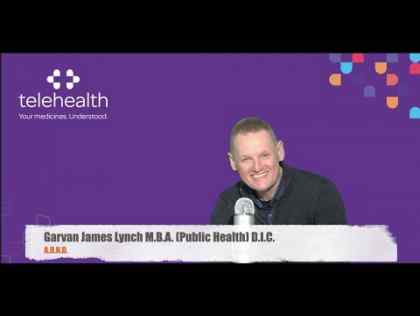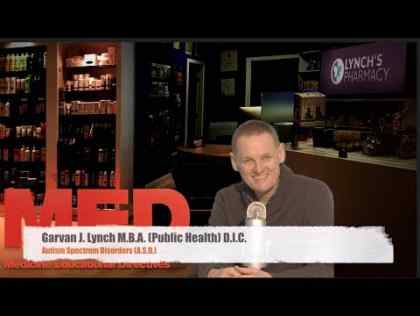Tyvense capsules contain the active ingredient lisdexamfetamine dimesylate, which is a type of medicine called a stimulant. It is used for the treatment of ADHD.
What is Tyvense used for?
- Attention deficit hyperactivity disorder (ADHD) in children aged six years and over.
- Lisdexamfetamine is reserved for treating ADHD in children for whom another stimulant called methylphenidate is not suitable or doesn't work.
The medicine can be continued into adolescence and adulthood if ADHD symptoms continue and you are still benefiting from the medicine.
How does Tyvense work?
Tyvense capsules contain the active ingredient lisdexamfetamine dimesylate, which is a type of medicine called a stimulant. It is used for the treatment of ADHD.
Lisdexamfetamine is known as a pro-drug. It is an inactive form of dexamfetamine that is gradually converted into dexamfetamine in the body.
Lisdexamfetamine is used to treat attention deficit hyperactivity disorder (ADHD) in children aged six years and over. This may seem an odd treatment for hyperactive children, as stimulants normally make people more active. However, stimulants at the doses used for ADHD have the opposite effect.
Lisdexamfetamine is converted into dexamfetamine, which works by affecting some of the natural chemicals that are found in the brain. In particular, it increases the activity of chemicals called dopamine and noradrenaline in areas of the brain that play a part in controlling attention and behaviour. These areas seem to be underactive in children with ADHD. It is thought that increasing the activity of these chemicals improves the function of these underactive parts of the brain. We still don't fully understand how stimulants work in children with ADHD, and they don't work for everyone. But they can be very useful at helping some children to learn to control their behaviour.
Lisdexamfetamine is converted into dexamfetamine gradually in the blood over the day. The effects of one morning dose last for 13 hours. This helps to control the symptoms of ADHD throughout the day.
How do I take Tyvense?
- Tyvense capsules should be taken once daily in the morning.
- The usual starting dose of Tyvense is one 30mg capsule daily. Your doctor may increase this to either one 50mg or one 70mg capsule daily, depending on the response to the medicine.
- Tyvense capsules can be taken either with or without food.
- The capsule can be swallowed whole with a drink of water. Alternatively the capsule can be opened and the entire contents mixed with soft food such as yogurt, or in a glass of water or orange juice. Use a spoon to break up any bits of powder and stir well to disperse it. All of the mixture should be taken immediately and not kept for taking later. You may notice a film left in the glass or container after taking the mixture; this is the inactive ingredients of the capsules and is nothing to worry about.
- If you forget to take your capsule in the morning you should not take it in the afternoon, because this may cause problems with sleeping during the night. Instead, leave out the forgotten dose and just take your next dose as usual the following morning. Don't take a double dose to make up for a missed dose.
- If the symptoms have not improved after one month of taking this medicine your doctor may decide to stop treatment. Where symptoms have improved, the medicine should be stopped from time to time, usually at least once a year, so that the condition can be assessed and to check if the medicine is still needed. However, in both cases, this medicine must not be stopped suddenly without your doctor's advice. When stopping treatment, the medicine should be withdrawn gradually, following the instructions given by your doctor.
Tyvense should be used with caution by
- People with decreased kidney function.
- People with mildly raised blood pressure.
- People with a history of fits or seizures, eg epilepsy.
- People with a personal or family history of involuntary muscle spasms (twitches or tics).
- People with a personal or family history of Tourette's syndrome (which involves involuntary repetition of speech, in particular obscene or vulgar words).
- People with a personal or family history of psychotic illness, which may include symptoms such as seeing, hearing or feeling things that are not there (hallucinations), believing things that are not true (delusions), feeling unusually suspicious (paranoia), feeling agitated, anxious or tense, or feeling depressed or guilty.
- People with a personal or family history of bipolar affective disorder (manic depression).
- People with anorexia nervosa.
- People with a history of drug abuse.
Tyvense should not be used by
- Children under six years of age.
- People who are allergic to other amfetamine derivatives.
- People with structural abnormalities in the heart.
- People with advanced hardening of the arteries (arteriosclerosis).
- People with hardening of the arteries in the heart (cardiovascular disease) that has caused symptoms such as chest pain or a previous heart attack.
- People with heart failure or an irregular heartbeat.
- People with moderate to severe high blood pressure (hypertension).
- People in unusually excitable, overactive or agitated states.
- People with an overactive thyroid gland (hyperthyroidism).
- People with glaucoma.
- Women who are pregnant or breastfeeding.
- People with hereditary blood disorders called porphyrias.
- People who have taken a monoamine-oxidase inhibitor antidepressant (MAOI) in the last 14 days.
- This medicine should not be used if you are allergic to any of its ingredients. Please inform your doctor or pharmacist if you have previously experienced such an allergy. If you feel you have experienced an allergic reaction, stop using this medicine and inform your doctor or pharmacist immediately.
Pregnancy and breastfeeding
Certain medicines should not be used during pregnancy or breastfeeding. However, other medicines may be safely used in pregnancy or breastfeeding providing the benefits to the mother outweigh the risks to the unborn baby. Always inform your doctor if you are pregnant or planning a pregnancy, before using any medicine.
- This medicine may be harmful to a developing baby and should not be used in pregnancy, particularly during the first trimester. Seek futher medical advice from your doctor.
- If you are having sex it is important to use an effective method of contraception to avoid getting pregnant. If think you could be pregnant or want to plan a pregnancy it is important to talk to your doctor straight away.
- Significant amounts of the active form of this medicine may pass into breast milk. As this could cause adverse effects on a nursing infant, this medicine should not be used by mothers who are breastfeeding. Seek further medical advice from your doctor.
Possible side effects of Tyvense
Medicines and their possible side effects can affect individual people in different ways. The following are some of the side effects that are known to be associated with this medicine. Just because a side effect is stated here does not mean that all people using this medicine will experience that or any side effect.
Very common
- Decreased appetite.
- Weight loss (less common in adults).
- Difficulty sleeping (insomnia).
- Headache.
- Dry mouth (less common in children and adolescents).
Common
- Irritability.
- Restlessness.
- Muscle spasms, tremor or twitching.
- Mood swings.
- Loss of appetite.
- Feeling or being sick.
- Diarrhoea or constipation.
- Abdominal pain.
- Dizziness.
- High temperature (fever) in children aged 6 to 12 years. This is uncommon in adults and adolescents.
- Feeling sleepy or tired. Sleepiness is uncommon in adults.
- Awareness of your heartbeat (palpitations). This is uncommon in children aged 6 to 12 years.
- Increased heart rate or blood pressure. This is uncommon in children aged 6 to 12 years.
- Excessive sweating in adults. This is uncommon in children and adolescents.
- Decreased sex drive and erectile dysfunction in adults.
Uncommon
- Blurred vision.
- Dilated pupils.
- Talking excessively, uncontrollably or incoherently.
- Depression.
- Anxiety or agitation. This is more common in adults.
- Aggression. This is more common in children aged 6 to 12 years.
- Sudden repetitive involuntary movements (twitching or tics). These are more common in children aged 6 to 12 years.
- Compulsive urges to pick at the skin.
- Itching, rash or raised red itchy rashes (urticaria).
- Feeling excessively happy or excited (euphoria).
- Mania.
- Hallucinations.
- Fits or seizures.
- Signs of heart muscle disease such as breathlessness or swelling of the legs.
- Severe allergic reaction (anaphylactic shock).
- Inflammation of the liver (hepatitis).
- Severe swelling of lips, face or tongue (angioedema).
- Severe allergic blistering skin reaction (Stevens-Johnson syndrome).
The side effects listed above may not include all of the side effects reported by the medicine's manufacturer. For more information about any other possible risks associated with this medicine, please read the information provided with the medicine or consult your doctor or pharmacist.
How can Tyvense affect other medicines?
- You should tell your doctor what medicines your child is already taking before starting treatment with this medicine. This includes medicines bought without a prescription and herbal medicines. Likewise, once treatment has started you should always check with your doctor or pharmacist before taking any new medicines, to make sure the combination is safe.
- This medicine must not be taken by people who are taking a type of medicine called a monoamine oxidase inhibitor (MAOI, eg tranylcypramine, phenelzine, isocarboxazid, moclobemide) to treat depression. It should also not be taken by people who have taken one of these antidepressants in the last 14 days.
- This medicine is not recommended for use in combination with rasagiline or selegiline, which are used to treat Parkinson's symptoms.
- This medicine may potentially be less effective in people taking antipsychotic medicines such as chlorpromazine or haloperidol.
- There may be an increased risk of side effects on the heart if this medicine is taken in combination with tricyclic antidepressants such as imipramine.
- There may be an increased chance of neurological side effects if SSRI antidepressants such as fluoxetine or paroxetine are taken in combination with dexamfetamine. These medicines may also reduce the breakdown of dexamfetamine in the body.
- Protease inhibitors for HIV infection, such as ritonavir, may prevent the breakdown of dexamfetamine in the body and could increase the risk of its side effects.
- Dexamfetamine opposes the effect of the blood pressure lowering medicine guanethidine.
- Check with your pharmacist before using cough and cold remedies in combination with Tyvense. These types of medicine sometimes contain ingredients that could affect blood pressure and so could be unsuitable to use in combination with dexamfetamine.
References:
https://www.wdrugs.com/?s=tyvense
http://www.medicines.ie/medicine/15775/SPC/Tyvense+30mg%2C+50mg+%26+70mg+Capsules%2C+hard/
http://www.hpra.ie/img/uploaded/swedocuments/2142630.PA0689_006_002.a795d918-c7e8-4ee1-86da-5cdd36364759.000001Package%20leaflet.140714.pdf
https://en.wikipedia.org/wiki/Lisdexamfetamine
http://www.ncpe.ie/drugs/l/lisdexamfetamine-dimesylate-tyvense/
http://www.netdoctor.co.uk/medicines/adhd/a8828/elvanse-lisdexamfetamine/



